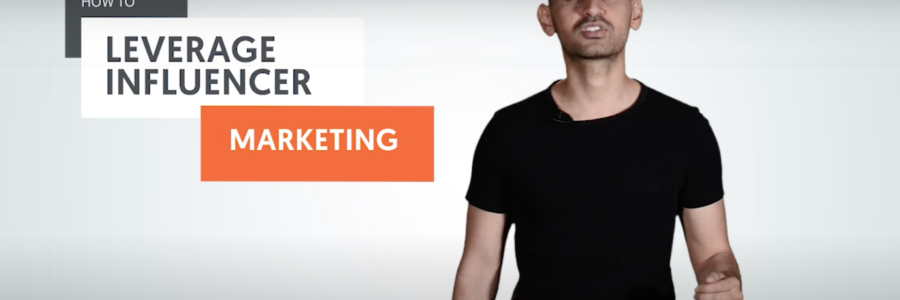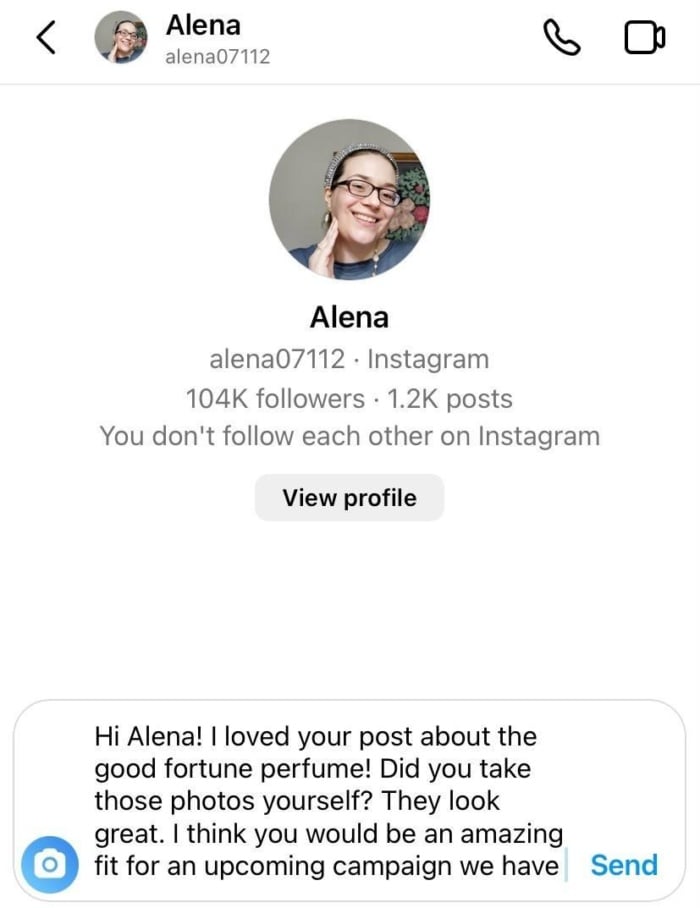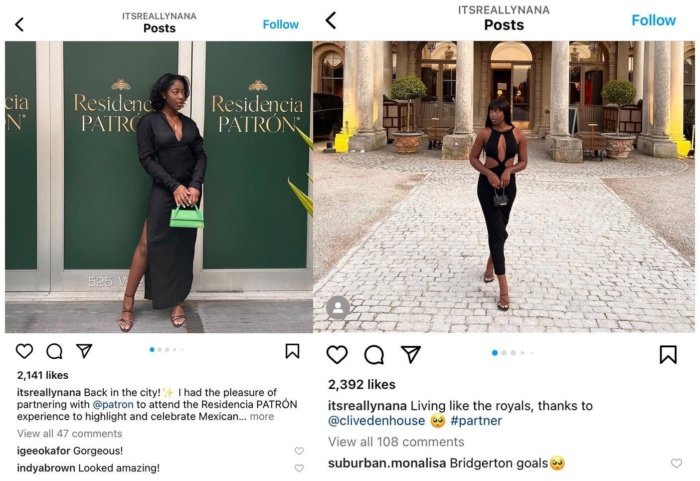
Influencer Marketing for Small Businesses
You know that today’s market demands every advantage you can get for your organization to succeed.
So what can you do to gain an edge?
Dive into the world of influencer marketing.
Influencer marketing for small business is one of the most powerful marketing methods available for small companies. With more than 4.26 billion social media users across the world in 2021, it’s no wonder that influencers are used by small and large businesses alike to promote their products.
But what is influencer marketing, and how can it actually help your business?
Goal Setting for Small Business Influencer Campaigns
Influencer marketing is the process of working with well-known social media personalities to promote your business. Before you get started with an influencer, first ask yourself: what are my goals?
When it comes to influencer marketing, the biggest mistake you can make is to have an unclear campaign goal.
Think about it: if you post without a plan, you’ll have a hard time explaining to an influencer what you want to accomplish, let alone analyzing your campaign’s success afterward.
That’s why it’s a good idea to understand the purpose of your campaign. What are your marketing goals? If your purpose is to increase followers, the strategy will look different than if you want to boost engagement or generate leads.
Physical goals, like higher sales or increased traffic to your business, should be included in your campaign plan. Remember, the whole point of influencer marketing is to help you make more money.
Once you have clear campaign goals, it’s time to connect with influencers.
Influencers: Not Just for Big Businesses
You don’t have to own a giant corporation to benefit from using influencers in a marketing campaign. In fact, influencer marketing can be a huge boost to your small business campaign!
Build awareness around your brand by allowing influencers to use their voices to spread your message. Through their own pages, each influencer has cultivated audiences with similar interests. With 10k-100k followers, even a micro-influencer can help grow your base at a reasonable price.
By working with influencers, you also gain access to new audiences at a fraction of the price of traditional marketing banners.
How much more effective is influencer marketing? On average, brands earn over $5 for every $1 spent on an influencer marketing campaign. That’s 11x the ROI of using traditional banner advertisements!
Finding the Right Influencers for your Business
So you’ve got your campaign goals set. Now what?
The next step is to find the influencer that fits best with your campaign. When researching influencers, the best influencer marketing platform for small businesses is Instagram, with 79% of brands considering it the most important platform for them. However, Tik Tok is a rising star in the social media world and could eventually become the next top dog. As of January 2022, Tik Tok has 1 billion monthly active users who spend an average of 850 minutes on the app each month!
With so many influencers online, it can appear overwhelming to find one to work with. Don’t let that hold you back, though! There are a few easy ways to narrow down your search.
Search your own social media pages:
- People who are already interested in your brand will be more passionate about collaboration.
- It will also have a more natural feel when a collaboration is announced.
- Look for people who consistently comment on your posts.
- Check and see if your account is tagged in posts. Anyone who regularly engages with your brand is a potential candidate.
- Don’t be afraid to ask your audience.
- Framed in the right way, like with a question sticker or poll, you can find an influencer and increase follower engagement at the same time.
Search hashtags related to your business:
- Don’t have a big following? That’s okay! Influencers in your niche are already broadcasting their interest in products similar to yours.
Peek at the competition:
- Work smarter, not harder! If you have competition, look through their social media accounts for influencers.
Review Your Influencer Options
By now, you’ve combed through your account, searched hashtags, and even took a peek at the audiences of the competition to find influencers. Are you ready to reach out? Not quite yet.
Before contacting your list of influencers, you take some time to inspect their accounts on a deeper level. Also known as influencer targeting, being selective with who you choose to work with is key to any successful influencer marketing campaign.
Make sure that the influencer’s audience is similar to yours. What is their geographic location? What is their age? Do they speak the same language as your market demographic? The goal here is to discover where your audiences overlap with each other.
Next, confirm that your potential influencers are legit. This is one of the few instances where the phrase ‘fake it till you make it’ is counterintuitive. Currently, followers can be bought to artificially inflate audience numbers. Thankfully, there are a few ways to detect “fake” followers:
Demographics. Look at where an influencer’s followers are located. Overall, are they in the same place as the influencer?
- Check how many of their followers have profile photos. How many followers have names that consist solely of random numbers and letters? These are all indicators of a phony following.
Engagement. In addition to the size of an influencer’s audience, you need to pay close attention to engagement rates.
- A huge following is useless unless that audience is engaged. High engagement rates mean followers are tuning in and taking action.
- To calculate an engagement rate, take the number of likes or comments on an influencer’s posts, divide it by their number of followers and then multiply by 100 to get a percentage.
- In general, you want to see at least 2-3% engagement for a worthwhile influencer. 5% engagement is considered great, while anything above 10% is viral and likely some stellar content creation.
Content. The last thing you want to double-check is the content style and quality of the influencers on your list.
- Do they align with your brand?
- Which influencers deliver high-quality content?
- What are their videos like?
- Are they high-end videos, or do they look like they were put together by an amateur?
- Ask questions like these when considering using influencer marketing for your small business.
Influencer Marketing Platforms for Small Businesses
As influencer marketing grows in popularity and scale, it can be difficult for small businesses to navigate these waters alone. That’s why so many companies are turning to influencer marketing platforms for small businesses
These platforms are designed to take the legwork out of the influencer review process.
Right now, the best influencer marketing platform for small business is Upfluence. Upfluence has tons of information on influencers and their relevant statistics. Users can search for influencers easily with their followers, interests, and engagement all available in one spot.
Don’t worry if Upfluence isn’t for you: there’s more than one influencer marketing platform for small business: in fact, there are quite a few! Sparktoro is a great audience research tool. Brandbassador is another influencer marketing platform for small e-commerce businesses, connecting them to potential influencers that can serve as brand ambassadors for their product, increasing their reach.
Another potential option is influencer engagement marketplaces, where businesses can post the type of needs they have and influencers can reach out if they think they can be a good fit.
Don’t want to deal with the hassle at all? I don’t blame you. Thankfully, there are full service influencer marketing agencies for small businesses as well!
An influencer marketing agency for small business works at all levels of the influencer collaboration process, including:
- Set the target audience for your campaign.
- Locate the right influencer for the job.
- Build a relationship with the influencer
- Set ideal campaign goal strategies
- Help influencers to create better content
- Monitor the campaign
Whether you go with an influencer marketing platform or agency, or if you decide to work in-house, you’ll still benefit from knowing how to reach out and work with influencers.
How to Start Working with Influencers
Now that you or your agency has found influencers to work with, it’s time to reach out.
A good rule of thumb is to check their account or webpage for an email contact. Make sure you introduce yourself personally so that they feel like they know who they’re talking to. This should make them more comfortable and willing to ask questions about your project.
Most professional influencers have a media kit of some kind. Asking for one is a great way to see if you are working with a serious influencer.
Once you’ve made introductions, talk about your campaign. Explain the direction of the campaign and be as transparent as possible about the timeline for the project, important dates, and rates.

What to Avoid When Reaching Out
As with any endeavor, there are certain practices that should be avoided when pursuing influencer marketing for a small business. For example, never use a bot to contact influencers. They come off as impersonal at best and spam at worst, pushing away potential collaborations. Instagram also penalizes bot behavior, which is why it’s best to avoid this practice.
Never reach out via a comment on a post. It’s unprofessional, so instead, stick to email or direct messages.
Another thing to do is never copy and paste the exact same message to every influencer. Again, it comes off as spammy and unprofessional. A better way to approach outreach is to add a few personal touches to your introductory message for each influencer.
Want to go that extra mile? Add some details about their page or their work. To get influencers to work with you, emphasize how they personally would be a great asset to your campaign. Trust me, it goes a long way.
The last thing to avoid is unrelated influencers. What good does talking to a cooking influencer do if you are running a campaign about 3D printing?

When it comes to the world of influencer marketing for small business, unrelated influencers are a waste of time! Confirm that potential collaborators fit your brand.
Best Practices for Small Business Influencer Campaigns
By now you’ve set up your campaign, found an influencer and are ready to start collaborating. Here are a few tips to help your campaign flourish.
- As you enter into negotiations, you’ll want to remain as open and transparent as possible. While rates vary, clear expectations of the influencer should always be made.
- How much you will pay, tasks and deadlines are mapped out ahead of time to avoid confusion down the road.
- Especially with larger projects, think about creating a formal contract for your influencer that outlines the requirements of the project.
- Share your resources! The easier you make it for influencers, the better results you’ll get. If you have a brand style guide that contains your logo, brand colors and taglines, influencers can use that to hit the ground running.
- Communicate your campaign goals, as well as any frequently asked questions about your campaign to streamline things.
- Track campaign metrics to ensure your project is reaching the goals you set out to achieve.
Once your campaign is complete, share the results with your influencers. This not only strengthens professional co-working relationships but can also get influencers to work with you in the future. In addition, you might also get insightful feedback from your influencer team. Used wisely, this can consistently improve future campaigns!
You should note that the FTC requires disclosures of endorsed relationships with businesses any time there is a material connection. This includes payments and gifts. When developing campaigns, make sure you are compliant with all laws and regulations.
FAQs
Influencers can be broken into groups by follower size. Nano-influencers have 1k-10k followers. Micro-influencers have a 10k-100k audience size, while macro-influencers are followed by 100k-1M people. The largest type is a mega-influencer, which is a person with over 1 million followers.
That’s not a problem at all! Gifting products through ambassadorships or referral programs is pretty common among smaller brands. Brandbassador is a prime example of an influencer marketing platform for small business that helps manage ambassadors for your brand.
Working with an influencer can boost your campaigns, increase brand awareness, give you access to new audiences and expand your base.
When it comes to using influencers for your brand, do your research! Make sure you are working with an influencer who has a real following, aligns with your brand, and has the skills needed to reach your campaign goals.
On average, brands earn over $5 for every $1 spent on an influencer marketing campaign. That’s 11x the ROI of traditional banner ads!
Conclusion
Adding influencers to your marketing campaigns can be the next big game changer for your business. However, with so many moving parts, it can be tough to even get influencers to work with you.
Let our agency know if you want help with your next influencer marketing campaign and we’ll be your guide.
Which influencers in your audience fit your brand?
